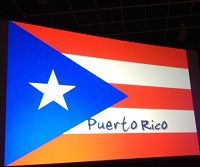Article
Puerto Rico's HIV AIDS Problem Grows As Economy Tanks
Author(s):
More than 40% of US AIDS/HIV cases are in San Juan, Puerto Rico, but economic turmoil there is making it hard to fight the epidemic.

Puerto Rico’s economic and political problems are taking a toll on efforts to fight HIV/AIDS, a panel said today at the 20th Annual United States Conference on AIDS in Hollywood, FL.
In a two-hour presentation today, a panel that included public health workers, advocates, elected representatives, and officials from the Puerto Rico Department of Health outlined a disturbing set of trends.
Young people are leaving Puerto Rica and make up most of the more than 89,000 people who left last year. The island’s population has dropped to 3.45 million in 2014 from 3.8 million in 2000.
Lack of funding for health services is contributing to HIV/AIDS cases, with San Juan, Puerto Rico the site of 44% of the US cases.
As of August, 2016 there are 20,409 people living with HIV in Puerto Rico, and an estimated one person in six has the virus but does not know it.
About 20% of the new cases diagnosed are full-blown AIDS, a sign that testing is not reaching HIV positive people early enough.
Adding to the HIV burden, said speaker Carlos Rodriguez-Diaz, MD, associate professor of public health at the University of Puerto Rico, there are cultural features that discourage people from getting testing, particularly men who have sex with men.
“The social determinants of the epidemic are poverty and stigma--a major impact since Puerto Rico is homophobic, patriarchal and super religious,” Rodriguez-Diaz said.
Among MSM who have HIV, 30% are suicidal, he said as are 20% of transgender HIV-positive women.
Prisons are a major source of HIV and they are full of people there for drug offenses related to substance abuse, another sign of the island’s economic and social turmoil.
Other speakers said one solution is for the island to become independent of the US and lose its territorial status, one it has had since 1898.
Under the current rules, Puerto Ricans are US citizens but cannot vote in presidential elections.
They also do not pay US federal income tax, another reason why there is too little money to pay for healthcare. The island’s Medicaid funding is a block grant and its amount has been frozen for decades.
The Affordable Care Act does not apply in Puerto Rico and other US territories, so insurers are not required to offer the essential services required in the US states.
Puerto Rico has $4 billion in debt, but instead of being allowed to restructure the debt on its own, it has been placed under the control of seven-person board. Among the provisions of the bill doing that, one known as PROMESA, the board has the right to lower the minimum wage to $4.25 an hour, make strikes illegal, eliminate environmental protections, and be forced to allow natural gas and mineral extraction.
Arguing that the $4 billion in debt pales beside the estimated $74 billion in revenues US firms based in Puerto Rico take away annually, several speakers said the island would be better off severing its territorial status.




